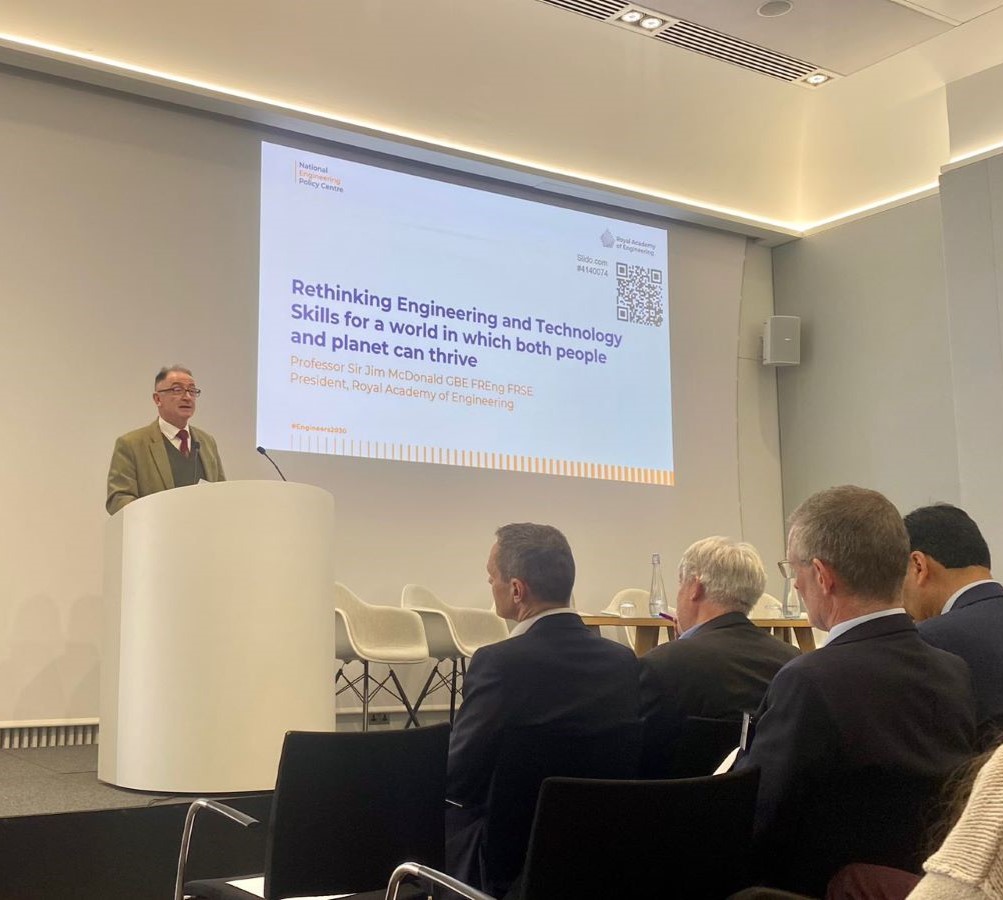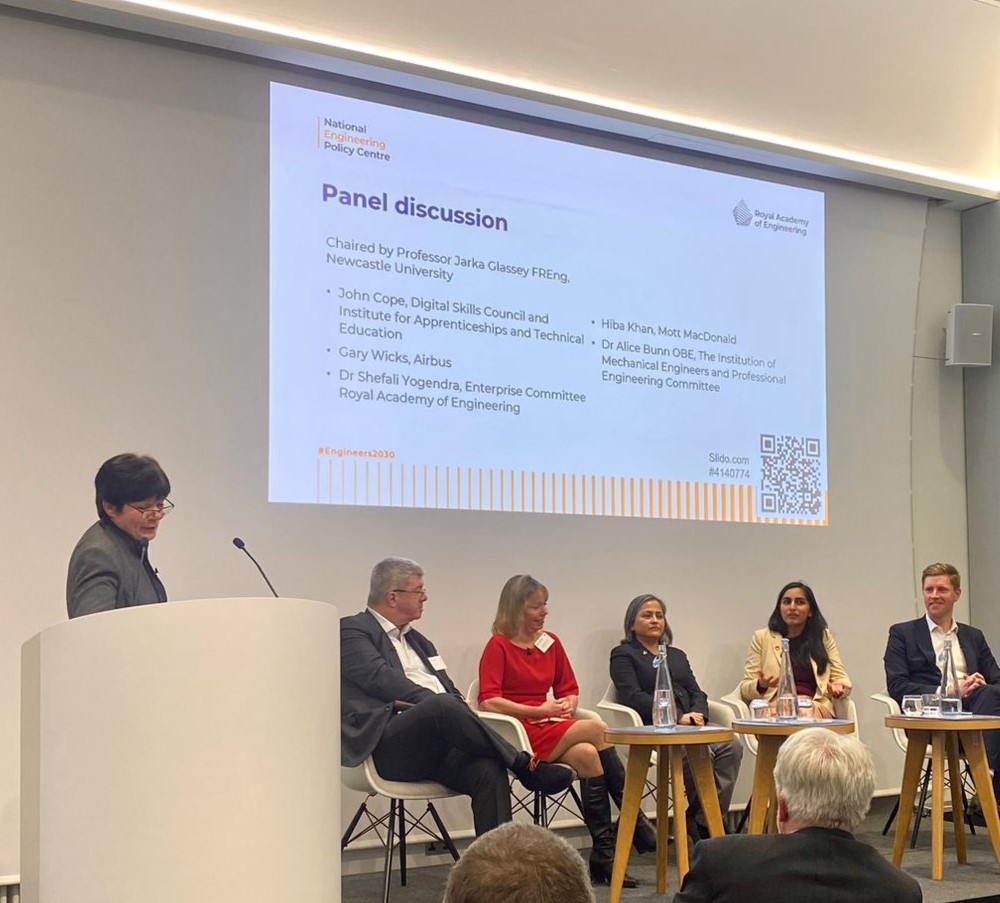The launch of the engineering profession’s Engineers 2030 project in March was a welcome and positive event. There was a unanimous view that the scale and urgency of societal challenges such as the climate emergency, food security and ageing population require a fundamental shift in how we think about engineering – and with it an urgent need to rethink engineers’ roles in the world. The optimism in the room came from many voices but none so compelling as the voices of two inspiring women who shared their insights into why they are becoming engineers.
Kayley Thacker, a 3rd year chemical engineering student from Birmingham University said that her undergraduate degree had, for the most part, lived up to her expectations. The technical knowledge she has gained has equipped her to work with the current infrastructure of our society but, in many other ways, there has been a disconnect between the theoretical concepts of university education and the realities of undertaking a real-world engineering career. Different types of engineers are taught in isolation, when they are all working to solve the same challenges and there is a lack of social responsibility in teaching across all engineering courses.
Different types of engineers are taught in isolation, when they are all working to solve the same challenges and there is a lack of social responsibility in teaching across all engineering courses.
She reflected that those challenges faced by engineers today require a collaborative and interdisciplinary approach, one that our current system does not fully embrace. Education should be as much about forging paths for the future as it is about understanding the constructs of the past. Citing the importance of ethics and responsibility as integral to the training of doctors and lawyers, she questioned why it is simply ‘tacked on’ to the end of engineering degrees. Engineers are responsible for the construction of buildings, motorways, vehicles, the food we eat and the products and services we use. If mistakes are made in their design and creation, thousands of people can be affected. Kayley’s plea was for students’ education to be led with the responsibility that they will shoulder throughout their careers and for all engineers to be trained to put people and the planet first.
Happily, Engineers 2030 is a catalyst for change and is set to do just that. In fact, over the last two years, the engineering profession has already been working with engineering educators across the UK university sector to support the changes Kayley has advocated for so eloquently.

On 18 March, a Re-imagined Degree Map, co-created by the Royal Academy of Engineering with Engineers Without Borders UK and a Sustainability Toolkit, developed in partnership with the Academy, the Engineering Professors Council and Siemens, were launched with the aim of helping academics embed social responsibility and sustainability into their teaching. These tools are the culmination of collaboration of academics and other professionals across the UK who continue to evolve their practice through discussions in a Systems Change Lab.
The second voice we heard in the room was Jade Kimpton, an apprentice substation engineer at National Grid. She explained how her role allows her to combine her passion for the environment with engineering, helping to improve society and tackle climate change.
Yet despite this, she is one of a minority of women in engineering. Women make up 16.5% of engineers[1] and only 35% of girls study science and technology subjects beyond GCSE level, often meaning they do not have the qualifications to access engineering careers.[2]
Jade was clear however that this doesn’t mean that women aren’t suited to engineering careers but rather that there are structural and perception challenges which the engineering profession needs to address. For example, broader and more inclusive pathways into engineering such as through apprenticeships, more diverse female role models, promotion of the variety of roles within engineering, the creation of new opportunities for women who haven’t studied STEM subjects and support for engineers in the workforce so that they don’t have to choose between a family or a career. They can have both.

Kayley and Jade’s speeches resonated with more than 200 people both in the room and online. Two panel debates with speakers from industry, the engineering profession and further and higher education built on their insights. Discussion ranged from the need for our education systems to embed sustainability if they are to be successful in making change; to teach value creation for the planet, not just for the economy; to ensure that engineering degrees and apprenticeships teach sustainability, ethics and inclusion systematically, and to ensure that the professional engineering institutions support this through accreditation, upskilling and reskilling.
Turning to the role of the UK government in supporting the growth of engineering skills in the economy, Sir Jim MacDonald, President of the Royal Academy of Engineering, said that government is moving in the right direction and the tendency towards letting the market dictate pace, scale and detail is still a concern. This is particularly true when we think of the skills needed to support the net zero transition, which is continually missed from the conversation.
He called for greater consideration of skills as a strategic national asset with more direct government intervention and less reliance on the market to find our future engineers and technicians. A national engineering and technology workforce strategy would certainly help to equip the UK with the skilled workforce needed to meet the challenges of sustainability and technological advancement.
It’s clear that the wider complex and fragmented systems that currently support the development of engineering skills in this country can too often result in competing voices and missed opportunities for coordination and cooperation. The same is true when aiming to reach engineering students, employers, policy makers and education and training providers.
As chair of the Engineers 2030 working group, I was delighted to close a lively afternoon of presentation and debate by launching the consultation of our Vision and Principles for Engineers 2030. The document highlights how engineering knowledge, skills and behaviours must change and sets an ambitious but achievable vision for the next 25 years for engineers. The initiative is very much in ‘listening’ mode in the coming months as the Vision is taken ‘on the road’ with the consultation open until 1 July. We want – and need - to hear from everyone across our diverse engineering sector – but also from voices who don’t traditionally engage in engineering. Without them, we won’t fully understand how our approach to inspiring, educating and developing our engineering workforce must change.
Whilst we engage across the UK – and perhaps further afield - on our vision in the coming months, we’ll also be moving to the next and critically important phase of our project. A vision and principles for Engineers 2030 shared by all is of course paramount. But we can’t afford simply to have ‘yet another report’. Engineers 2030 is about accelerating positive change that will equip engineers and technicians with the skills and knowledge to achieve a sustainable society and a prosperous economy for the future.
Meaningful change will come from working together to develop a roadmap to set out how the policies and structures of the UK’s four national education and skills systems needs to transform. The Royal Academy of Engineering has led the way in developing systems approaches to help policymakers both in the UK and internationally, understand highly complex and adaptive systems and show where effective action can be taken in these systems.
This means examining the elements and functions of the UK’s education and skills systems from primary, secondary, further and higher education through to in-work training and professional development to map and develop a shared understanding of the whole landscape.
Meaningful change will come from working together to develop a roadmap to set out how the policies and structures of the UK’s four national education and skills systems needs to transform.
By analysing the interrelationships and patterns that shape the behaviour of the UK’s complex education and skills systems, we’ll be able to surface the opportunities and challenges in some of the ‘sub-systems’. We have already started to do this through our work in sustainability in engineering higher education and to demonstrate where maximum impact for change can be achieved to realise the Engineers 2030 vision.
We’re looking forward to hearing your views on the Engineers 2030 Vision and Principles. Please watch our launch event and let us know what you think by responding to our short consultation or email [email protected].
Professor Bashir M. Al-Hashimi CBE FREng FRS
Chair, Engineers 2030 working group
The Royal Academy of Engineering Trustee Board member
Vice President (Research & Innovation)
and Arm Professor of Computer Engineering
King’s College London.
[1] Engineering UK, 2023
[2] Women in Tech, 2023
